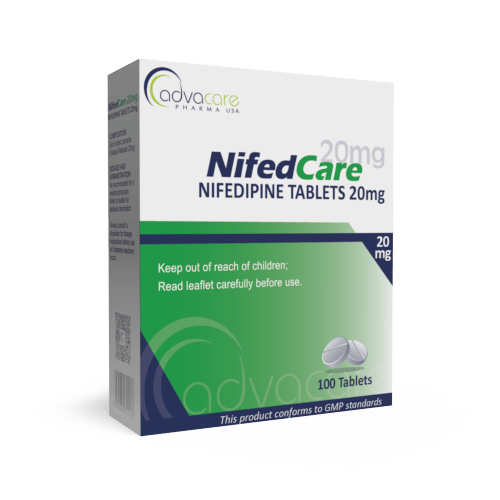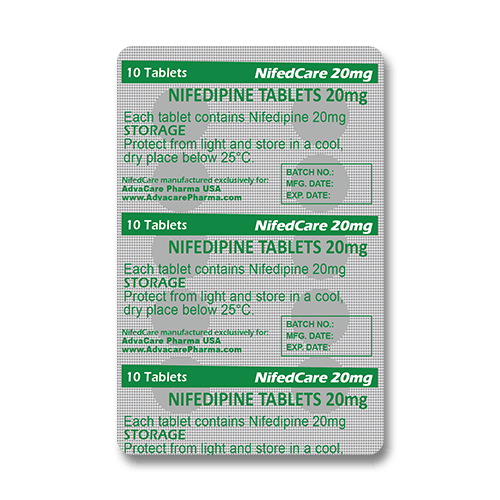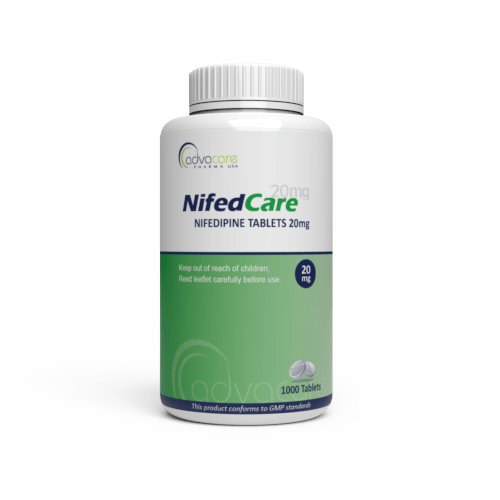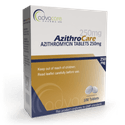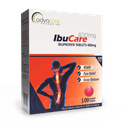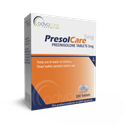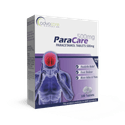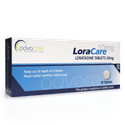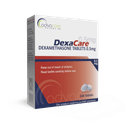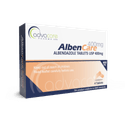- Home›
- Pharmaceuticals›
- Pharmaceutical Tablets›
- Nifedipine Tablets
Nifedipine Tablets
Dosage
Packaging
What is Nifedipine?
Active Ingredients: Nifedipine
Nifedipine Tablets are a drug used to treat hypertension (high blood pressure) and angina pectoris (chest pain). Nifedipine is used to reduce the resistance within the blood vessels, which lowers blood pressure. It also relaxes the arteries that supply blood and oxygen to the cardiac muscles, which reduces angina.
This drug may be prescribed to reduce the frequency and severity of Raynaud's attacks that are associated with Raynaud's Phenomenon. It works by relaxing the blood vessels in the fingers and toes, which are then less likely to constrict in response to cold or stress.
Nifedipine belongs to a group of drugs known as calcium channel blockers. The active ingredient works by relaxing blood vessels and the muscles of the heart. The arteries of the feet and hands are widened, which improves blood circulation to the lower extremities. By widening and relaxing the smaller arteries of the body, the pressure at which the heart must push in order to pump blood around the body is significantly reduced.
Nifedipine Tablets are produced with a dosage of 10mg, 20mg, or 30mg. Nifedipine Capsules are also available for distribution.
AdvaCare Pharma is a GMP-certified producer and exporter of Nifedipine Tablets. We offer a wide range of high-quality and cost-effective medical products that are available for distribution. These medications have been manufactured in our facilities in China, India, and the USA.
Why are we a top Nifedipine manufacturer?
AdvaCare Pharma is a trusted Nifedipine manufacturer committed to providing quality-assured, cost-effective pharmaceuticals for an ever-changing global market. Manufacturing a wide range of 200+ pharmaceutical products in tablet form, we ensure that all of our oral solid dosage forms adhere to stringent GMP standards.
We operate according to a unique "vested supplier-distributor relationship" business model, in which we tie our success in a market to that of our distributor. Such a model facilitates a closer relationship by working together to achieve pre-defined goals for market entry and expansion. As a Nifedipine manufacturer and global supplier, we implement unique strategies to ensure successful distribution.
Uses
What is Nifedipine used for?
It is used to treat hypertension (high blood pressure), angina pectoris (chest pain), and Raynaud phenomenon.
How are Nifedipine Tablets used?
This medication is intended to be taken orally. The tablet should be swallowed whole. Do not crush, chew, or break the medicine.
How should Nifedipine Tablets be stored?
When not in use, this medication should be stored in the original packaging at room temperature, in a location away from moisture, heat, and light.
Can Nifedipine be stopped abruptly?
Patients should continue to take this medicine even if their symptoms improve, until advised by a healthcare professional for treatment discontinuation.
How do you know if Nifedipine is working?
When beginning treatment, blood pressure should be taken at baseline. Though Nifedipine begins to work right away, it may take a few weeks to reach its full effect. Blood pressure should be checked periodically during long-term therapy in order to determine an individual's response to the medication.
What dose should be taken and for how long?
Recommended dosage of Nifedipine may vary based on different medical conditions and age.
Adult Dosing Dosage may vary based on different medical indications:
- For vasospastic angina, the usual dose is 10-20mg, taken 3 times per day. The starting dose should be 10mg, taken 3 times, and then the dose can be increased every 7-14 days until the desired effect. The maximum dosage is 180mg per day. Patients with coronary artery spasm may require a higher dosage of 20-30mg, taken 3-4 times per day. When discontinuing treatment, the dose should be gradually reduced.
- For chronic stable angina, the usual dose is 10-20mg, taken 3 times per day. The initial dose is 10mg, taken 3 times per day, and the dose can be increased every 7-14 days until the desired effect. The maximum dosage is 180mg per day. When discontinuing treatment, the dose should be gradually reduced.
- For pregnancy-related hypertensive emergencies, the usual dose is 10-20mg, taken every 2-6 hours, as needed. The starting dose is 10-20mg, taken once, and a repeated dose may be taken after 20 minutes. The maximum dosage is 180mg per day.
- For tocolysis, the usual dose is 10-20mg taken every 4-8 hours for 48 hours. The starting dose should be 10mg, taken every 20 minutes for a maximum of 4 doses. Alternatively, a loading dose of 30mg can be given, and then 20mg taken after 90 minutes.
- For Raynaud phenomenon, the usual dose is 10-30mg, taken three times per day. The initial dose is 10mg, taken 3 times per day, and the dose can be increased every 7-14 days until the desired effect. The maximum dosage is 180mg per day. When discontinuing treatment, the dose should be gradually tapered.
- For pulmonary arterial hypertension in patients with a positive vasoreactivity test, the usual dose is 20-60mg, taken three times per day. The starting dose should be 10mg, taken 3 times per day. The maximum dosage is 240mg per day. When discontinuing treatment, the dose should be gradually reduced.
Pediatric Dosing Recommended dosage for children may vary based on different medical conditions:
- For hypertrophic cardiomyopathy, the usual dose is 0.6-0.9mg per kg, divided and given in 3-4 doses per day. Tablets should be given with food.
- For the Raynaud phenomenon in patients 12 years and older, the usual dose is 0.2-1.0mg per kg, divided and given in 3-4 doses per day. The starting dose is 0.2mg/kg/dose, divided and given 3 times per day. Then the dose can be increased every 7-14 days until the desired effect. The maximum dosage is 180mg per day. When discontinuing treatment, the dose should be gradually tapered.
- For pulmonary arterial hypertension, the usual dose is 1-2.5mg per kg of body weight, given twice per day. The starting dose is 0.2-0.3mg per kg, given three times a day. The maximum dosage is 240mg per day. When discontinuing treatment, the dose should be gradually tapered.
The dosage is based on medical condition, response to treatment, age, and weight. Refer to a doctor or pharmacist for guidelines on dosage. Do not exceed what they advise.
What happens if a dose is missed?
The medication should be taken as soon as possible, but it should be skipped if it is nearly time for the next dose. Two doses should not be taken at one time.
Who can use Nifedipine?
Nifedipine can be administered to adults, but caution is advised for specific groups of patients.
Children Pediatric dosing is dependent on body weight.
Pregnant This drug is not expected to cause fetal harm, but there is limited human data on this topic, and should only be used by pregnant women if clinically necessary.
Breastfeeding Nifedipine is a preferred calcium channel blocker for hypertension for use during breastfeeding. There is limited human data on this topic, so it should only be used if clinically necessary.
Geriatric Older adults may have different responses to medication due to usual age-related changes in metabolism.
Close monitoring and dosage adjustments may be necessary:
- Hepatic impairment: nifedipine is metabolized in the liver, so patients with hepatic impairment should be monitored closely. It may be necessary to adjust the dosage.
- Congestive heart failure (CHF): nifedipine may affect heart function, so this drug must be prescribed with caution.
- Aortic stenosis: nifedipine may affect the cardiovascular system. Caution is advised when prescribing Nifedipine to patients with restricted blood flow due to aortic stenosis.
- Hypotension: as this medicine affects blood pressure, it is necessary to monitor blood pressure and adjust dosage as necessary.
Other warnings or considerations
Patients who are scheduled for surgery should inform the surgical team ahead of time. Nifedipine may need to be discontinued 36 hours before surgery.
Some forms of nifedipine may contain lactose and should not be taken by patients with galactose intolerance or severe lactose intolerance (milk sugar).
Side Effects
As with all pharmaceuticals, some unwanted effects can occur from the use of Nifedipine Tablets.
Common side effects include, but may not be limited to:
- headache
- nausea
- flushing
- heartburn
- muscle cramps
- constipation
- weakness
- reduced sexual desire or ability
- lightheadedness or dizziness
Seek medical attention if the following serious side effects develop:
- low blood pressure
- liver damage
- edema
- chest pain
- allergic reaction (such as rash, hives, swelling, difficulty breathing or swallowing)
For a comprehensive understanding of all potential side effects, consult a medical professional.
If any symptoms persist or worsen, or you notice any other symptoms, please call your doctor immediately.
Precautions
Do NOT use Nifedipine Tablets if:
- You are allergic to it.
- You have low blood pressure.
- You have congestive heart failure.
- You have liver damage.
- You are younger than 18 years.
- You are pregnant or breastfeeding.
Alcohol should be avoided, as it may worsen the adverse effects caused by nifedipine.
Grapefruit increases the effects of nifedipine, so grapefruit products should be avoided during treatment.
Due to possible drug interactions, consult with your doctor about any medications you are taking before your treatment with nifedipine. Some known drug interactions include an antibiotic (e.g. rifabutin, rifampin), anticonvulsants (carbamazepine, oxcarbazepine, phenobarbital, phenytoin), or herbal supplements such as St. John's wort.
Before treatment, any discontinuation of a beta-blocker medicine should be tapered under the guidance of a healthcare professional.
This medication may not be suitable for people with certain conditions, so it is important to consult with a doctor if you have any health conditions. Some conditions include a heart attack, severe hypotension, aortic stenosis (severe narrowing of the aortic valve in the heart), heart failure, cirrhosis or liver disease, kidney disease, or diabetes.
The immediate-release nifedipine is contraindicated for the treatment of hypertensive crisis and hypertension.
References
Nifedipine therapy in angina pectoris: Evaluation of safety and side effects
To evaluate safety from treatment with nifedipine, data from over 3000 patients in both open and controlled multiple-dose studies were collected and analyzed. Patients with clinically significant adverse events, those diagnosed with congestive heart failure (CHF), individuals concurrently using beta blockers, and those receiving nifedipine for more than 6 months were evaluated.
The results of this analysis affirm the safe use of nifedipine across a wide range of angina patients, including those with CHF and those undergoing concurrent beta-blocker therapy.

You might be interested in...
Why AdvaCare Pharma?
As an industry leader, we are aware of our responsibility to provide affordable and sustainable solutions to improve healthcare worldwide.
